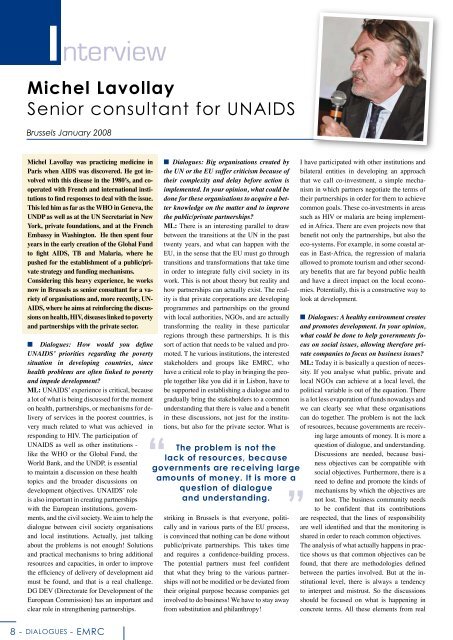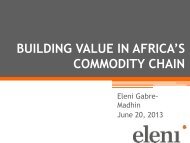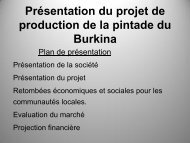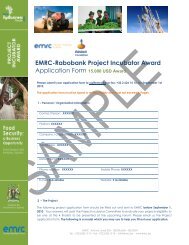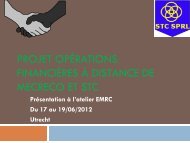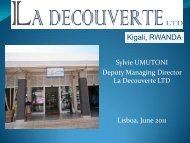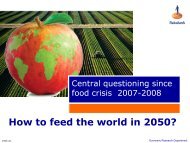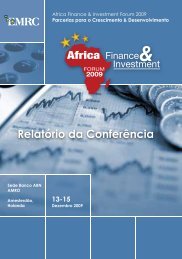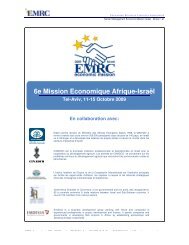English - EMRC
English - EMRC
English - EMRC
Create successful ePaper yourself
Turn your PDF publications into a flip-book with our unique Google optimized e-Paper software.
I nterview<br />
Michel Lavollay<br />
Senior consultant for UNAIDS<br />
Brussels January 2008<br />
Michel Lavollay was practicing medicine in<br />
Paris when AIDS was discovered. He got involved<br />
with this disease in the 1980’s, and cooperated<br />
with French and international institutions<br />
to find responses to deal with the issue.<br />
This led him as far as the WHO in Geneva, the<br />
UNDP as well as at the UN Secretariat in New<br />
York, private foundations, and at the French<br />
Embassy in Washington. He then spent four<br />
years in the early creation of the Global Fund<br />
to fight AIDS, TB and Malaria, where he<br />
pushed for the establishment of a public/private<br />
strategy and funding mechanisms.<br />
Considering this heavy experience, he works<br />
now in Brussels as senior consultant for a variety<br />
of organisations and, more recently, UN-<br />
AIDS, where he aims at reinforcing the discussions<br />
on health, HIV, diseases linked to poverty<br />
and partnerships with the private sector.<br />
■ Dialogues: How would you define<br />
UNAIDS’ priorities regarding the poverty<br />
situation in developing countries, since<br />
health problems are often linked to poverty<br />
and impede development?<br />
ML: UNAIDS’ experience is critical, because<br />
a lot of what is being discussed for the moment<br />
on health, partnerships, or mechanisms for delivery<br />
of services in the poorest countries, is<br />
very much related to what was achieved in<br />
responding to HIV. The participation of<br />
UNAIDS as well as other institutions -<br />
like the WHO or the Global Fund, the<br />
World Bank, and the UNDP, is essential<br />
to maintain a discussion on these health<br />
topics and the broader discussions on<br />
development objectives. UNAIDS’ role<br />
is also important in creating partnerships<br />
with the European institutions, governments,<br />
and the civil society. We aim to help the<br />
dialogue between civil society organisations<br />
and local institutions. Actually, just talking<br />
about the problems is not enough! Solutions<br />
and practical mechanisms to bring additional<br />
resources and capacities, in order to improve<br />
the efficiency of delivery of development aid<br />
must be found, and that is a real challenge.<br />
DG DEV (Directorate for Development of the<br />
European Commission) has an important and<br />
clear role in strengthening partnerships.<br />
■ Dialogues: Big organisations created by<br />
the UN or the EU suffer criticism because of<br />
their complexity and delay before action is<br />
implemented. In your opinion, what could be<br />
done for these organisations to acquire a better<br />
knowledge on the matter and to improve<br />
the public/private partnerships?<br />
ML: There is an interesting parallel to draw<br />
between the transitions at the UN in the past<br />
twenty years, and what can happen with the<br />
EU, in the sense that the EU must go through<br />
transitions and transformations that take time<br />
in order to integrate fully civil society in its<br />
work. This is not about theory but reality and<br />
how partnerships can actually exist. The reality<br />
is that private corporations are developing<br />
programmes and partnerships on the ground<br />
with local authorities, NGOs, and are actually<br />
transforming the reality in these particular<br />
regions through these partnerships. It is this<br />
sort of action that needs to be valued and promoted.<br />
T he various institutions, the interested<br />
stakeholders and groups like <strong>EMRC</strong>, who<br />
have a critical role to play in bringing the people<br />
together like you did it in Lisbon, have to<br />
be supported in establishing a dialogue and to<br />
gradually bring the stakeholders to a common<br />
understanding that there is value and a benefit<br />
in these discussions, not just for the institutions,<br />
but also for the private sector. What is<br />
The problem is not the<br />
lack of resources, because<br />
governments are receiving large<br />
amounts of money. It is more a<br />
question of dialogue<br />
and understanding.<br />
striking in Brussels is that everyone, politically<br />
and in various parts of the EU process,<br />
is convinced that nothing can be done without<br />
public/private partnerships. This takes time<br />
and requires a confidence-building process.<br />
The potential partners must feel confident<br />
that what they bring to the various partnerships<br />
will not be modified or be deviated from<br />
their original purpose because companies get<br />
involved to do business! We have to stay away<br />
from substitution and philanthropy!<br />
I have participated with other institutions and<br />
bilateral entities in developing an approach<br />
that we call co-investment, a simple mechanism<br />
in which partners negotiate the terms of<br />
their partnerships in order for them to achieve<br />
common goals. These co-investments in areas<br />
such as HIV or malaria are being implemented<br />
in Africa. There are even projects now that<br />
benefit not only the partnerships, but also the<br />
eco-systems. For example, in some coastal areas<br />
in East-Africa, the regression of malaria<br />
allowed to promote tourism and other secondary<br />
benefits that are far beyond public health<br />
and have a direct impact on the local economies.<br />
Potentially, this is a constructive way to<br />
look at development.<br />
■ Dialogues: A healthy environment creates<br />
and promotes development. In your opinion,<br />
what could be done to help governments focus<br />
on social issues, allowing therefore private<br />
companies to focus on business issues?<br />
ML: Today it is basically a question of necessity.<br />
If you analyse what public, private and<br />
local NGOs can achieve at a local level, the<br />
political variable is out of the equation. There<br />
is a lot less evaporation of funds nowadays and<br />
we can clearly see what these organisations<br />
can do together. The problem is not the lack<br />
of resources, because governments are receiving<br />
large amounts of money. It is more a<br />
question of dialogue, and understanding.<br />
Discussions are needed, because business<br />
objectives can be compatible with<br />
social objectives. Furthermore, there is a<br />
need to define and promote the kinds of<br />
mechanisms by which the objectives are<br />
not lost. The business community needs<br />
to be confident that its contributions<br />
are respected, that the lines of responsibility<br />
are well identified and that the monitoring is<br />
shared in order to reach common objectives.<br />
The analysis of what actually happens in practice<br />
shows us that common objectives can be<br />
found, that there are methodologies defined<br />
between the parties involved. But at the institutional<br />
level, there is always a tendency<br />
to interpret and mistrust. So the discussions<br />
should be focused on what is happening in<br />
concrete terms. All these elements from real<br />
- DIALOGUES - <strong>EMRC</strong>


